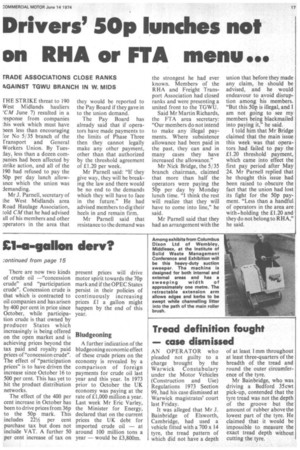LI -a-gallon dery by the year's end?
Page 17

Page 19

If you've noticed an error in this article please click here to report it so we can fix it.
Crucial OPEC meeting will decide future fuel prices — but crude oil prices will continue to explode
AS recorded briefly in CM last week, the oil producing countries have been recommended by OPEC officials to raise taxes on crude oil to an extent that, with other price increases, the retail price of fuel could be around El a gallon by the end of this year.
We asked Bart Collins, editor of our associate journal, Petroleum Times to assess the significance of this latest OPEC move. He writes as follows: Last week the Economic Commission of OPEC the Organisation of Petroleum Exporting Countries declared their intention of recommending to Ministers of the member States an increase from the current 55 per cent tax to 87 per cent on existing posted prices.
Posted prices are the reference against which royalty and taxes are computed. For instance the current posted price of Iranian crude is $11.65. The producing state gains a 121,4 per cent royalty on this plus a 55 per cent tax on the remainder. Thus tax paid royalty paid price of Iranian crude is $7.062.
For governments of producing states to acquire the power to change or fix this price is a declaration of their right to raise taxes at their own discretion. If this recommendation we re endorsed and enacted by the Ministers, this would be equivalent to an increase in world crude oil prices of 50 per cent.
On October 16 last year the oil producing states of the Middle East, without prior consultation with either oil companies or consuming states, virtually doubled the price of crude oil. On the following day the Arab producers, it will be remembered, introduced their 5 per cent per month cut-back. In two days they increased the price and limited the supply.
Price explosion
Suddenly crude oil prices exploded and reached their peak towards the end of November last year when a consignment of Iranian government owned crude achieved the world record price of $17.40 a barrel. Some idea of the vast increase that had taken place over two years is gained by a comparison with the January 1972 price of $2.59 posted.
The OPEC members were bewildered at the crude oil prices achievable and towards the end of December last year they doubled the posted price again.
From September 1 1973 almost simultaneously with the rising prices major oil producing States gained a greater share in their respective oil industries. In September Libya took 51 per cent control. In October Iraq took 100 per cent control. Algeria had had 51 per cent control since February 1971, while in recent months Kuwait and other smaller producing States have negotiated 60 per cent control. There are now two kinds of crude oil —"concession crude" and "participation crude". Concession crude is that which is contracted to oil companies and has arisen by 400 per cent in price since October, while participation crude is that owned by producer States which increasingly is being offered on the open market and is achieving prices beyond the tax paid and royalty paid prices of "concession crude". The effect of "participation prices" is to have driven the increase since October 16 to 500 per cent. This has yet to hit the product distribution networks.
The effect of the 400 per cent increase in October has been to drive prices from 36p to the 50p mark. This includes 221/2 per cent purchase tax but does not include VAT. A further 50 per cent increase of tax on present prices will drive motor spirit towards the 70p mark and if the OPEC States persist in their policies of continuously increasing prices £1 a gallon might happen by the end of this year.
Bludgeoning
A further indication of the bludgeoning economic effect of these crude prices on the economy is revealed by a comparison of foreign payments for crude oil last year and this year. In 1973 prior to October the UK economy was paying at the rate of £1,000 million a year. Last week Mr Eric Varley, the Minister for Energy, declared that on the current prices the UK debt for imported crude oil — at around 100 million tons a year — would be £3,800m.




























































































































